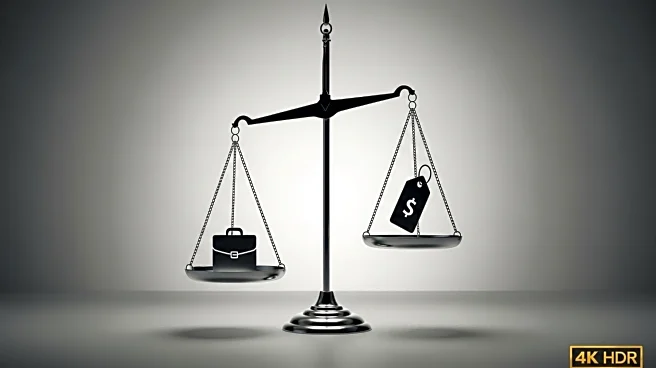What is the story about?
What's Happening?
The University of Michigan's preliminary October sentiment index reveals a slight decline in consumer sentiment, dropping to 55 from 55.1 in September. This marks the lowest level in five months, although it remains above the median projection from a Bloomberg survey of economists. The survey indicates that consumers expect prices to rise at an annual rate of 4.6 percent over the next year, slightly down from 4.7 percent the previous month. Over the next five to ten years, consumers anticipate a 3.7 percent annual increase in costs, unchanged from September. The survey highlights ongoing concerns about high prices and weakening job prospects, with 63 percent of respondents expecting unemployment to rise in the next year. Additionally, more than two-thirds of participants foresee inflation outpacing their income growth in the coming year.
Why It's Important?
The subdued consumer sentiment reflects broader economic challenges, including inflation and job market uncertainties, which could impact consumer spending—a critical component of economic activity. The expectation of rising unemployment and inflation exceeding income growth suggests potential strain on household finances, which may lead to reduced consumer spending. This situation poses challenges for businesses reliant on consumer demand and could influence economic policy decisions. The sentiment among Republicans has improved, reaching its highest level since President Trump's first term, while sentiment among Democrats has declined, indicating potential political implications.
What's Next?
The survey results may prompt policymakers to address inflation and job market concerns to bolster consumer confidence. Businesses might need to adapt to changing consumer behaviors, potentially focusing on cost-effective strategies to attract cautious spenders. The political divide in consumer sentiment could influence upcoming policy debates and electoral strategies, as parties seek to address economic issues resonating with their constituents.
Beyond the Headlines
The survey underscores the importance of economic indicators in shaping public perception and policy. The absence of official data due to a government shutdown highlights reliance on private-sector surveys for economic insights. The political divide in sentiment may reflect broader societal divisions, influencing policy priorities and electoral outcomes.
















